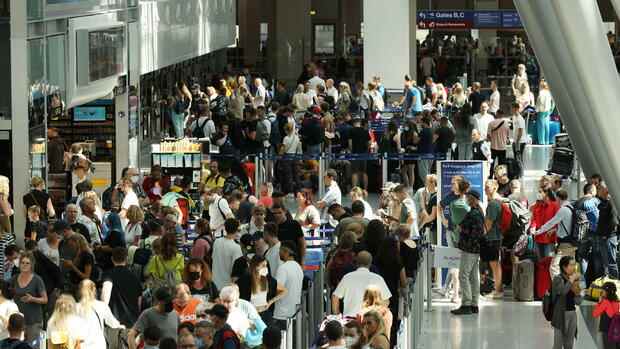“The experiment, with which sovereign aviation security tasks were placed in private hands decades ago, has finally failed,” said the SPD rapporteur for passenger rights in the Bundestag’s legal committee, Zanda Martens, the Handelsblatt. “Air security tasks should therefore be returned to where they belong – in public hands.”
Martens proposed Düsseldorf Airport as a nationwide model project for reducing aviation security tasks. “In the medium term, the model project must show that the federal government does not outsource its aviation security tasks to private service providers, but must retain responsibility and control over working conditions, smooth operational processes and effective defense against terrorism,” said the SPD politician.
A lack of staff in baggage handling, among other things, is the cause of the tense situation at German airports with long waiting times – including in Düsseldorf. In the corona crisis, airports, airlines and service providers had cut staff and lost specialists who were looking for other jobs.
Top jobs of the day
Find the best jobs now and
be notified by email.
Under pressure from the airports and their ground handling service providers, the federal government finally paved the way for the accelerated recruitment of temporary workers with airport experience in Turkey. This is intended to alleviate the problems with handling at the airports. The speech was last of about 1000 workers.
Munich Airport as a model
Federal Transport Minister Volker Wissing (FDP) did not rule out a long-term change in the organization of security checks at airports. The federal police are basically responsible for the process of the checks, but also the state police at some airports.
However, the federal police do not carry out checks themselves, but have also commissioned private security service providers since the 1990s. Companies such as DSW, Frasec, Kötter and Securitas now employ thousands of aviation security assistants across Germany. The providers compete for the service contracts, which always run for several years. The competition between security companies is intended to save costs, but it also puts a lot of pressure on employees – and leads to mistakes.
>> Read also: Airport chaos: does poker for training costs exacerbate the lack of control staff?
Things are different in Munich. Here, the passenger and baggage controls have long been in the hands of the state. Every passenger is checked before their flight by employees of the security company at Munich Airport (SGM). This belongs to the Free State of Bavaria. Wissing told the “Kölner Stadt-Anzeiger” that he could not judge whether Bavaria’s model was the best solution for the whole of Germany.
For the SPD domestic politician Sebastian Hartmann, on the other hand, the matter is clear. “The SPD parliamentary group has been working for years to ensure that the security checks at German airports come back into the hands of the state, according to the Munich model,” Hartmann told the Handelsblatt.
The aviation expert from the Verdi union, Özay Tarim, supports the initiative. “Bayern has shown how it could work,” he said. “The Free State has founded its own security company, which does not work for profit, but pays its employees according to the tariffs of the public service.” This has been running for years with a stable staffing level without any problems. “This model should be implemented nationwide.”
Fraport boss: “The summer will remain difficult”
Hartmann accused the Union of having blocked here for years. “But now, with new, progressive majorities, we have the opportunity to finally get rid of the patchwork quilt in the aviation security system and end the annual holiday chaos in the summer.”
>> Also read here: “A Travelogue of Horrors”: Chaos in aviation wears passengers down
The Greens are not averse to nationalizing security controls. “We do not close ourselves to a discussion about the reorganization of aviation security tasks,” said parliamentary group leader Konstantin von Notz. “In the current situation, however, it would not provide the necessary, quick remedy,” he added.
In addition, von Notz warned that the result of a new distribution of tasks could not be that the costs would be passed on from the airlines to the taxpayer. “We continue to see it as the task of airport operators and airlines to provide sufficiently well-trained staff in order to avoid disproportionately long waiting times and flight cancellations.”
The SPD politician Martens wants to prevent public funds from being “sacrificed to the profit motive of private companies” in the future. The privatization is the main reason for the “complex problem situation” with the sometimes considerable staff shortages at airports. “In the short term, the shortage of staff must be remedied by sufficiently qualified employees who are paid according to collective bargaining agreements – without wage dumping and exploitation,” said Martens.
According to von Notz, the federal government is doing its part to ensure that sufficient staff are available as quickly as possible in the current situation. “Flight safety is paramount,” he said. “Politicians have a duty to guarantee them.”
The next endurance test for travelers is on the weekend – with the start of the holidays in Hesse and Rhineland-Palatinate. Frankfurt Airport (Fraport) is gearing up for the busiest days of this summer in terms of passenger numbers. Up to 200,000 passengers a day are expected in the two terminals.
The head of the airport, Stefan Schulte, dampened expectations of smooth passenger handling. “Summer will remain difficult,” said Schulte of the newspaper “Mannheimer Morgen”. It was underestimated how much people had to catch up if they wanted to travel again. Every forecast was clearly outdated.
More: Winners and losers of the pandemic: This is where the missing workers are now employed
